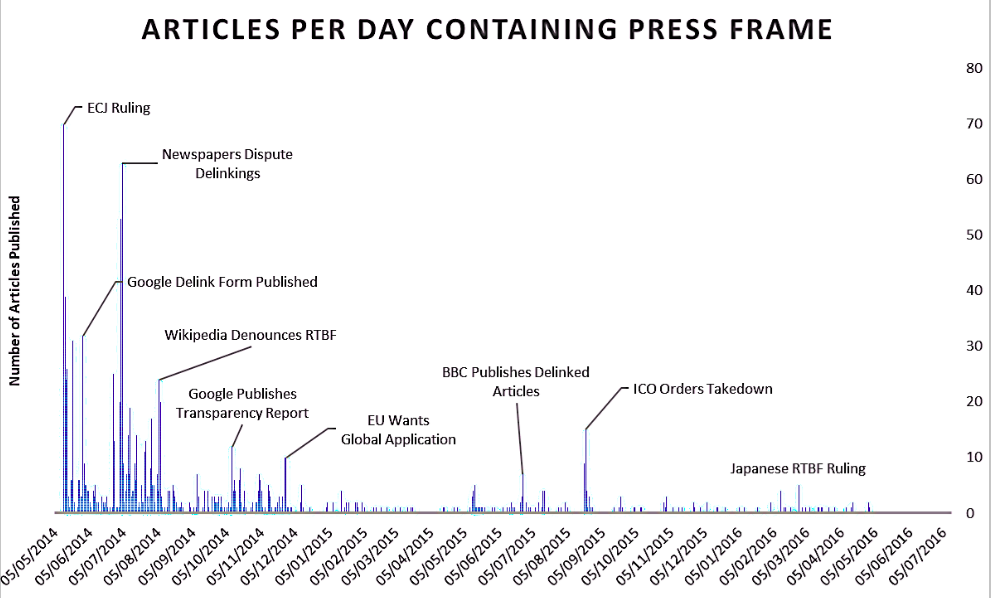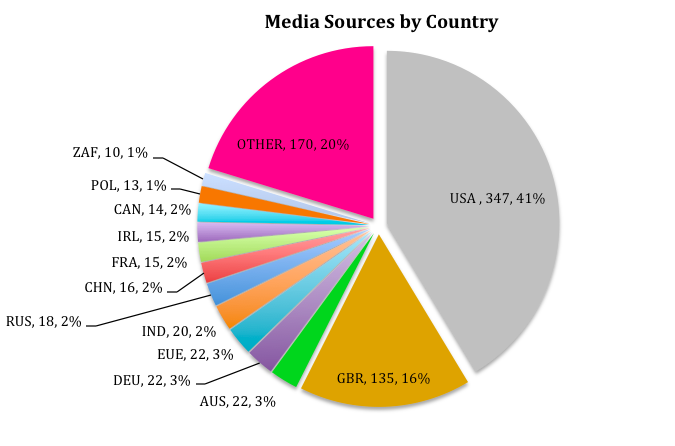Research Collaborative</em>
Source Criticism and Mediated Disinformation</a> </h2>This international group of scholars, funded by the Norwegian Research Council (2021 - ongoing), engage in critical, empirical analysis of the challenges tech and platform companies, fact checking organisations, and journalists face when addressing disinformation. The project also explores ways to detect and counter disinformation, specifically during periods of elections
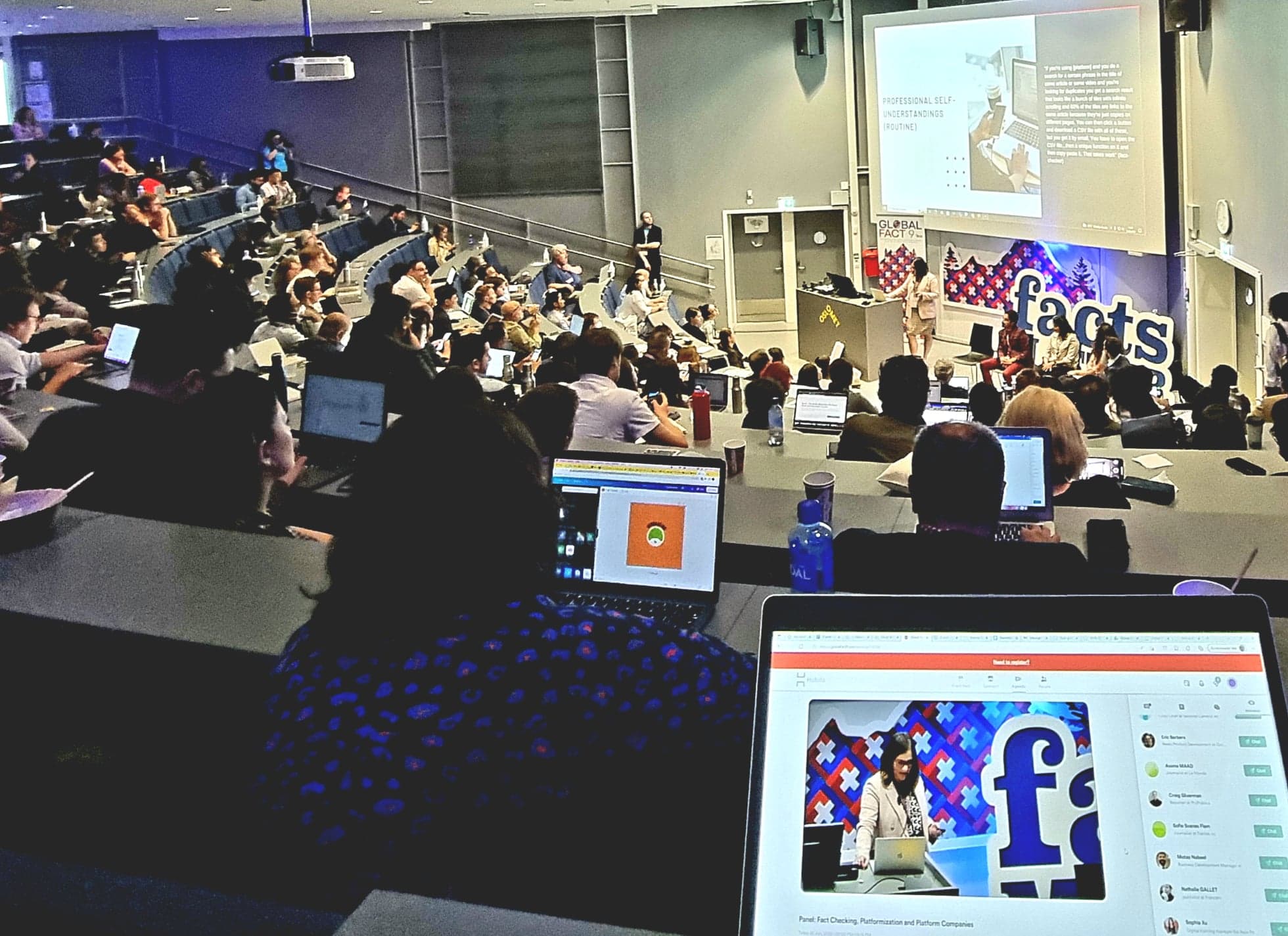
Image from the 2022 Global Fact conference, the annual fact checking summit, which was hosted by the team in Oslo.
</article> </div>Posts
Future Blog Post
Published:
This post will show up by default. To disable scheduling of future posts, edit config.yml and set future: false.
Blog Post number 4
Published:
This is a sample blog post. Lorem ipsum I can’t remember the rest of lorem ipsum and don’t have an internet connection right now. Testing testing testing this blog post. Blog posts are cool.
Blog Post number 3
Published:
This is a sample blog post. Lorem ipsum I can’t remember the rest of lorem ipsum and don’t have an internet connection right now. Testing testing testing this blog post. Blog posts are cool.
Blog Post number 2
Published:
This is a sample blog post. Lorem ipsum I can’t remember the rest of lorem ipsum and don’t have an internet connection right now. Testing testing testing this blog post. Blog posts are cool.
Blog Post number 1
Published:
This is a sample blog post. WHyyyyyy. Lorem ipsum I can’t remember the rest of lorem ipsum and don’t have an internet connection right now. Testing testing testing this blog post. Blog posts are cool.
publications
Study on Personal Data Stores
Published in European Commission, DG Connect, 2015
DG Connect commissioned this research and ensuing report to evaluate whether the concept of personal data stores is a viable mechanism to increase consumer trust and engagement in the Digital Single Market and to ensure wider access to good quality personal data.
Recommended citation: Brochot, Brunini, Eisma, Larsen, and Lewis. (2015). "Study of Personal Data Stores." European Commission, DG Connect.
The Digital Information Verification Field
Published in The Whistle, 2015
This report is the result of The Whistle team’s review of the current digital information verification field. We examined the actors, their aims, and their processes in order to identify best practices, find potential partners in the field, and determine if there were any gaps The Whistle could fill.
Recommended citation: Larsen, Rebekah. (2015). "The Digital Information Verification Field." The Whistle. 1(2). http://ral73.github.io/files/the-whistle-field-report.pdf
Mapping Right to be Forgotten frames: Reflexivity and empirical payoffs at the intersection of network discourse and mixed network methods
Published in New Media and Society, 2020
Using mixed methods—hyperlink network mapping, textual analysis (qualitative and quantitative), and semi-structured interviews—I examine online framing of a controversial data protection concept, the Right to be Forgotten. Initial, more “traditional” research approaches allowed for insight only into the most central and visible frames and sources. In an attempt to diversify sources and framings, I began focusing on the margins and off the “networked public sphere.” This article thus also recounts the significant empirical findings that resulted from such reflexivity and reorientation.
Recommended citation: Larsen, Rebekah. (2020). "Mapping Right to be Forgotten frames: Reflexivity and empirical payoffs at the intersection of network discourse and mixed network methods" New Media and Society. 22(7). https://journals.sagepub.com/doi/full/10.1177/1461444820912534
‘Information Pressures’ and the Facebook Files: Navigating Questions around Leaked Platform Data
Published in Digital Journalism, 2022
Recently leaked Facebook data included material from the platform’s internal social science research units. Given its character—and the likelihood of future whistleblowing—this case presents an opportunity for reflection on current and future academic engagement with leaked data. This contribution is grounded in the experiences of some members of a small, international team of journalism scholars, after being offered access to the leaked data by a media organization. It also describes other academic-involved initiatives—their similarities, differences, and efforts—working toward expanded access to and/or usage of this data.
Recommended citation: Rebekah Larsen (2022) ‘Information Pressures’ and the Facebook Files: Navigating Questions around Leaked Platform Data, Digital Journalism, DOI: 10.1080/21670811.2022.2087099. https://www.tandfonline.com/doi/abs/10.1080/21670811.2022.2087099
Technologies and fact-checking: a sociotechnical mapping and assessment
Published in Chapter in Disinformation Studies: Perspectives in an emerging research field, 2022
This chapter assesses and analyzes the sociotechnical infrastructures available to and potentially used in fact-checking, in the form of digital technologies associated with fact-checking. The chapter presents findings from an international and systematic assessment of digital technologies associated with fact-checking. For this assessment, we collected data from primary and secondary sources between fall 2020 and spring 2022. This assessment is guided by a sociotechnical framework that enables analysis of the interrelationships between humans and technology.
Recommended citation: Westlund, Oscar, Larsen, R., L. Graves, L. Kavtaradze. (2022) “Technologies and fact-checking: a sociotechnical mapping and assessment”. Chapter in Disinformation Studies: Perspectives in an emerging research field. LabCom Books. https://labcomca.ubi.pt/en/disinformation-studies-perspectives-from-an-emerging-field/
Knowledge Work in Platform Fact-Checking Partnerships
Published in International Journal of Communication, 2023
This article explores how platforms, news publishers, and fact-checkers describe the trade-offs they make in partnerships to counter misinformation. Using 54 interviews with these actors active in the global fact-checking field, it shows that resources and news values constitute key aspects of these partnerships. They contribute to knowledge shaping of what it means to fight misinformation (e.g., focusing on debunking, resource-allocation inequalities), and what types of misinformation matter for the public. This study highlights two kinds of problems in the growing anti-misinformation field, namely, coordination (technical, as to how to integrate different efforts by multiple actors) and cooperation (different organizations have different goals).
Recommended citation: V Bélair-Gagnon, R Larsen, L Graves, O Westlund. (2023) "Knowledge Work in Platform Fact-Checking Partnerships". International Journal of Communication. https://ijoc.org/index.php/ijoc/article/view/19851
From Public Reason to Public Health: Professional Implications of the “Debunking Turn” in the Global Fact-Checking Field
Published in Digital Journalism, 2023
This article examines the dramatic shift in the global field of fact-checking organizations since 2016, from checking claims by politicians and other public figures to policing viral misinformation on social networks. What practitioners call “debunking,” once a minor focus, now dominates the agenda of leading outlets and accounts for the bulk of fact-checks produced worldwide, driven in part by commercial partnerships between fact-checkers and platform companies. This study investigates what this sudden realignment means for fact-checkers themselves, drawing on interviews and meta-journalistic discourse to examine the impact on how these organizations assign value and draw boundaries in their growing transnational field. We highlight different discursive strategies fact-checkers use to explain the debunking turn, depending on their own field position, and show how shifting boundaries reflect wider concerns about autonomy from platform partners. We suggest that debunking discourse illustrates an incipient shift away from the “public reason” model implicit in journalism’s professional logic, to a more instrumental, “public health” model of newswork adapted to a digital media environment dominated by platform companies.
Recommended citation: L Graves, V Bélair-Gagnon, R Larsen. (2023) "From Public Reason to Public Health: Professional Implications of the “Debunking Turn” in the Global Fact-Checking Field". Digital Journalism. https://www.tandfonline.com/doi/full/10.1080/21670811.2023.2218454
What Is the Problem with Misinformation? Fact-checking as a Sociotechnical and Problem-Solving Practice
Published in Journalism Studies, 2024
Misinformation is a complex and global problem of social and technical dimensions. It is a problem that is exacerbated and sought to be solved by using diverse technologies. It is also a problem that flourishes on platforms and can lead to partnerships with platform companies. These sociotechnical dimensions of misinformation as a problem involve different actors. Some actors create or contribute to the problem, while others perceive it as their problem to solve and work to address it. Identifying the problem of misinformation is at the heart of the issue of problem-solving in fact-checking, as different actors have interests in how problems are discursively presented. This article draws on an international interview study conducted throughout 2020–2022 with 46 fact-checking actors (21 fact-checkers, 14 journalists, and 11 newsroom managers). This article analyzes how these actors reflect on “misinformation problems,” and how these problems become “fact-checking problems” for the actors to work with and solve. Ultimately, the article argues that fact-checking must be approached as a sociotechnical and problem-solving-oriented practice. Doing so highlights specific obstacles in information distribution and platform affordances.
Recommended citation: O Westlund, V Bélair-Gagnon, L Graves, R Larsen, S Steensen. (2024) "What Is the Problem with Misinformation? Fact-checking as a Sociotechnical and Problem-Solving Practice". Journalism Studies. https://www.tandfonline.com/doi/full/10.1080/1461670X.2024.2357316
Social Platforms and the Spread of Misinformation
Published in Routledge Handbook of Political Campaigning, 2024
The Routledge Handbook of Political Campaigning provides an essential, global, and timely overview of current realities, as well as anticipating the trajectory and evolution of campaigning in the coming years. This chapter gives an overview of roles that social media platforms can play in contemporary political campaigns, especially in the context of disinformation but some historical precedents.
Recommended citation: R Larsen and V Belair-Gagnon. (2024) "Social Platforms and the Spread of Misinformation" in Lilleker, D.(ed) The Routledge Handbook of Political Campaigning https://www.routledge.com/The-Routledge-Handbook-of-Political-Campaigning/Lilleker-Jackson-Kalsnes-Mellado-Trevisan-Veneti/p/book/9781032356716?srsltid=AfmBOopthd3iEjhihtFY_q5Ho0yQTlOv3P5LQ38ptaoX1_og1_P2LAB-
research
Research Project - Alternative Media Ecosystems
This research stream engages explicitly with media environments deeply affected by religion, rurality, and radio. Currently, I am exploring the Utah media ecosystem as an insightful case study, mapping actors, networks, technologies, digital identities, and cultural/ideological influences.
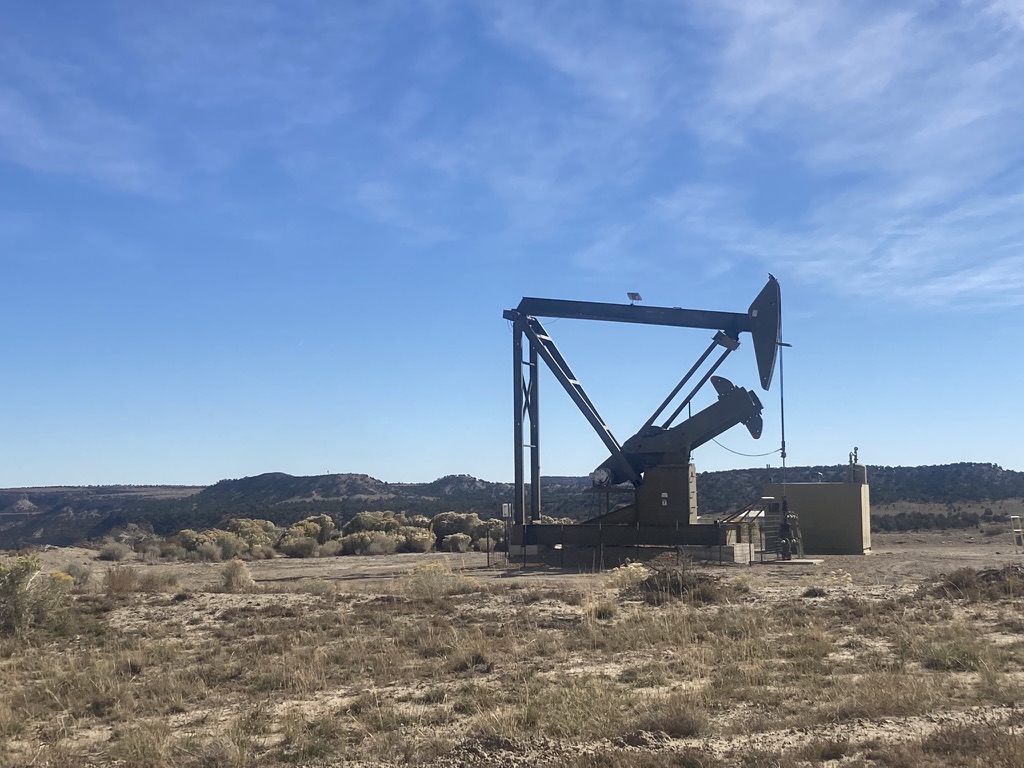
Image taken during fieldwork during US elections, which included interviews at several talk radio stations. This image was taken in Carbon county, a rural region with a deep history of oil and coal production.
Book Project - The Right to be Forgotten Decade
The Right to Be Forgotten Decade: Definitional Battles and Platform Power is my first solo monograph. It operationalizes and historicizes platform power through a topical analysis, demonstrating how platform companies manipulated headlines and technical newsroom operations.
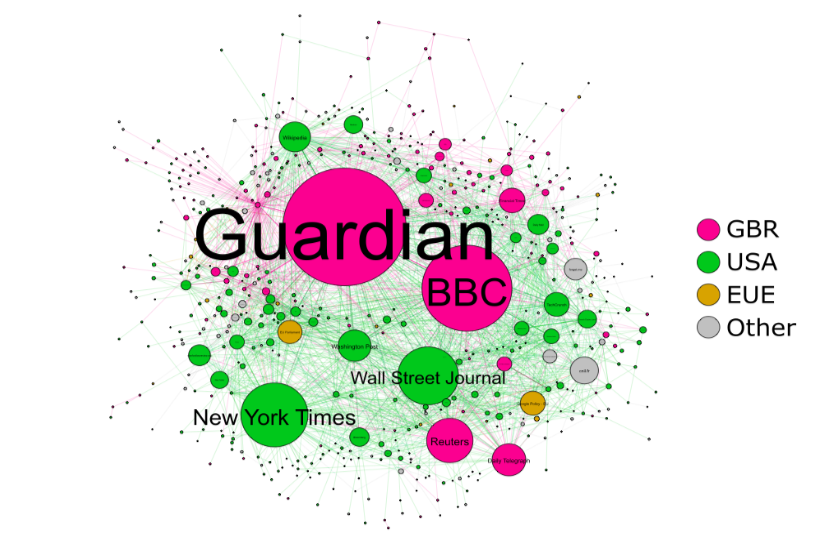
This is a network rendering of the most visible sources for coverage of a controversial privacy concept in the 2010s.
Research Collaborative - Source Criticism and Mediated Disinformation
This team of international scholars engages in critical, empirical analysis of the challenges tech and platform companies, fact checking organisations, and journalists face when addressing disinformation. The ‘SCAM’ project also explores ways to detect and counter disinformation, specifically during periods of elections.

Image from the 2022 Global Fact conference, the annual fact checking summit, which was hosted by the team in Oslo.
talks
Researching Think Tanks with Digital Methods and Data Sprints (with Tchilingirian, J. and Oman, S.)
Published:
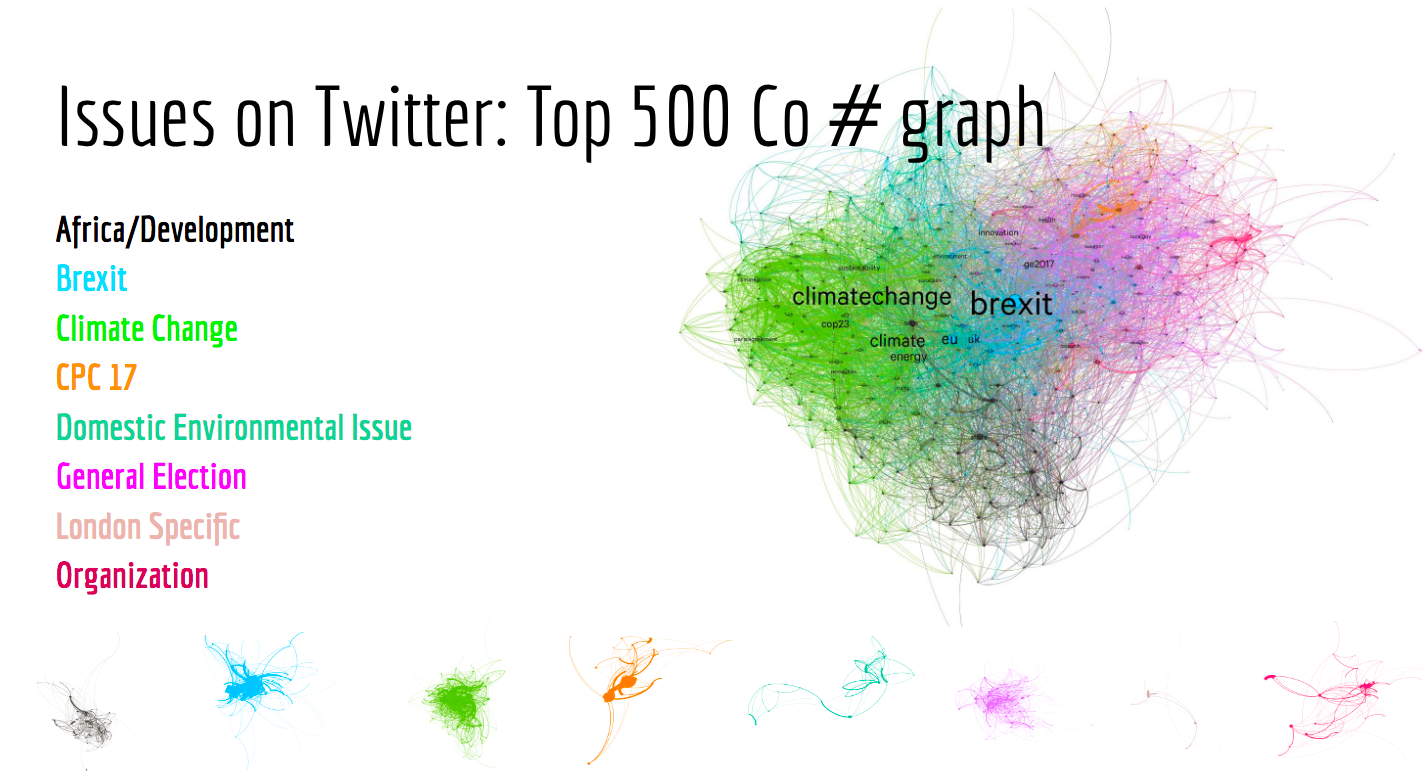
Media Manipulation, Visibility, and Rights: Public Discussion Around the Right to Be Forgotten
Published:
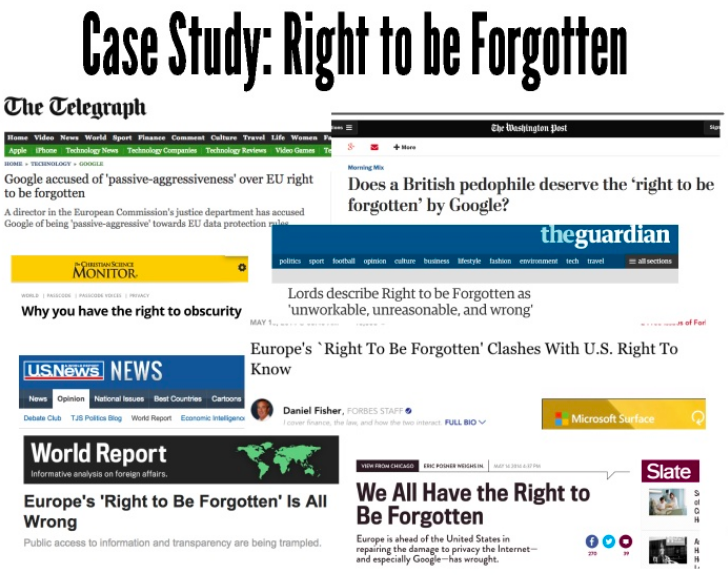
Networked Discussions about the Network: Public Discussion around the Right to be Forgotten
Published:
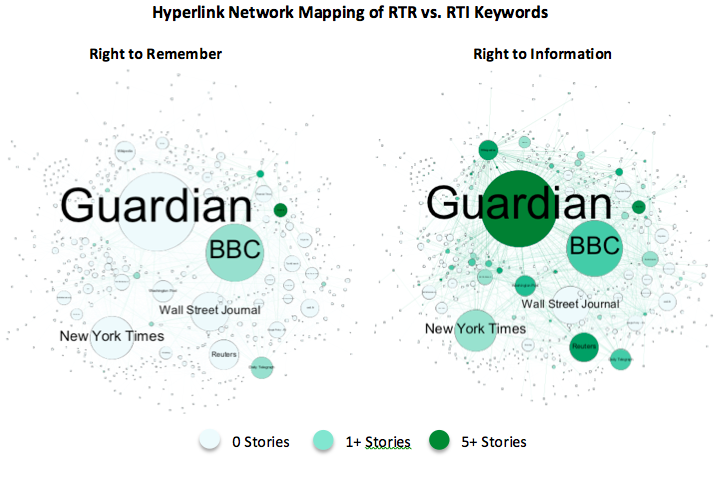
Data into Theory: Visibility in Media and Culture Research
Published:
See a recording of this presentation and discussion here.
Approaching a Pressured Press in Context: Differing Journalistic Responses to Media Controversy
Published:
Presentation of findngs from PhD research on the Right to be Forgotten, comparing responses within two major UK news brands to Google takedown notifications.
Connecting the global fact-checking field and technological development: A Technographic Case Study of the InVID/WeVerify Plugin
Published:
Presentation of developing book project about the Right to be Forgotten as a precedent-setting definitional controversy in the 2010s, giving insight into contemporary platform power.
Personal Data and Platform Power from 2014 - 2024: The Right to Be Forgotten
Published:
Overview of nascent book project. Questions addressed included:
- What have we learned about ‘big tech’, exportation/importation of legal frameworks, and continued colonial exploitation of parts of the Global Majority? How can studying things like ‘meaning making’ help reveal mechanisms/actors at work in this space?
- How can/should academics write about things like technology and media when there’s a sense that they are changing so quickly? How can we productively avoid and/or harness hope/hype cycles?
Technology and Politics in Local Context: Rural Talk Radio in the US
Published:
Invited presentation on in-progess work, at (a Weatherhead Institute workshop series)[https://www.wcfia.harvard.edu/event/politics-and-social-change-workshop-09-26-24].
Digitization and Polarization in Local Context: Contemporary Rural Talk Radio Stations in the US
Published:
Beyond Infotainment and Digital-Only Paradigms: Conservative talk radio in rural USA
Published:
Invited talk at the Centre for Governance and Human Rights, University of Cambridge.
teaching
Supervising and Lecturing, University of Cambridge, 2017 - 2019
Undergraduate courses, University of Cambridge, Department of Sociology, 2019
Click on link above for more information and sample lecture slides.
Course convenor, MIT, Spring 2023
Undergraduate courses, MIT, Comparative Media Studies, 2023
Click on link above for more information and sample lecture slides.
Kaufman Teaching Certificate Program, 2023
Undergraduate courses, MIT, Comparative Media Studies, 2023
Click on link above for more information.
Source Criticism and Mediated Disinformation</a> </h2>
This international group of scholars, funded by the Norwegian Research Council (2021 - ongoing), engage in critical, empirical analysis of the challenges tech and platform companies, fact checking organisations, and journalists face when addressing disinformation. The project also explores ways to detect and counter disinformation, specifically during periods of elections
Image from the 2022 Global Fact conference, the annual fact checking summit, which was hosted by the team in Oslo.
Posts
Future Blog Post
Published:
This post will show up by default. To disable scheduling of future posts, edit config.yml and set future: false.
Blog Post number 4
Published:
This is a sample blog post. Lorem ipsum I can’t remember the rest of lorem ipsum and don’t have an internet connection right now. Testing testing testing this blog post. Blog posts are cool.
Blog Post number 3
Published:
This is a sample blog post. Lorem ipsum I can’t remember the rest of lorem ipsum and don’t have an internet connection right now. Testing testing testing this blog post. Blog posts are cool.
Blog Post number 2
Published:
This is a sample blog post. Lorem ipsum I can’t remember the rest of lorem ipsum and don’t have an internet connection right now. Testing testing testing this blog post. Blog posts are cool.
Blog Post number 1
Published:
This is a sample blog post. WHyyyyyy. Lorem ipsum I can’t remember the rest of lorem ipsum and don’t have an internet connection right now. Testing testing testing this blog post. Blog posts are cool.
publications
Study on Personal Data Stores
Published in European Commission, DG Connect, 2015
DG Connect commissioned this research and ensuing report to evaluate whether the concept of personal data stores is a viable mechanism to increase consumer trust and engagement in the Digital Single Market and to ensure wider access to good quality personal data.
Recommended citation: Brochot, Brunini, Eisma, Larsen, and Lewis. (2015). "Study of Personal Data Stores." European Commission, DG Connect.
The Digital Information Verification Field
Published in The Whistle, 2015
This report is the result of The Whistle team’s review of the current digital information verification field. We examined the actors, their aims, and their processes in order to identify best practices, find potential partners in the field, and determine if there were any gaps The Whistle could fill.
Recommended citation: Larsen, Rebekah. (2015). "The Digital Information Verification Field." The Whistle. 1(2). http://ral73.github.io/files/the-whistle-field-report.pdf
Mapping Right to be Forgotten frames: Reflexivity and empirical payoffs at the intersection of network discourse and mixed network methods
Published in New Media and Society, 2020
Using mixed methods—hyperlink network mapping, textual analysis (qualitative and quantitative), and semi-structured interviews—I examine online framing of a controversial data protection concept, the Right to be Forgotten. Initial, more “traditional” research approaches allowed for insight only into the most central and visible frames and sources. In an attempt to diversify sources and framings, I began focusing on the margins and off the “networked public sphere.” This article thus also recounts the significant empirical findings that resulted from such reflexivity and reorientation.
Recommended citation: Larsen, Rebekah. (2020). "Mapping Right to be Forgotten frames: Reflexivity and empirical payoffs at the intersection of network discourse and mixed network methods" New Media and Society. 22(7). https://journals.sagepub.com/doi/full/10.1177/1461444820912534
‘Information Pressures’ and the Facebook Files: Navigating Questions around Leaked Platform Data
Published in Digital Journalism, 2022
Recently leaked Facebook data included material from the platform’s internal social science research units. Given its character—and the likelihood of future whistleblowing—this case presents an opportunity for reflection on current and future academic engagement with leaked data. This contribution is grounded in the experiences of some members of a small, international team of journalism scholars, after being offered access to the leaked data by a media organization. It also describes other academic-involved initiatives—their similarities, differences, and efforts—working toward expanded access to and/or usage of this data.
Recommended citation: Rebekah Larsen (2022) ‘Information Pressures’ and the Facebook Files: Navigating Questions around Leaked Platform Data, Digital Journalism, DOI: 10.1080/21670811.2022.2087099. https://www.tandfonline.com/doi/abs/10.1080/21670811.2022.2087099
Technologies and fact-checking: a sociotechnical mapping and assessment
Published in Chapter in Disinformation Studies: Perspectives in an emerging research field, 2022
This chapter assesses and analyzes the sociotechnical infrastructures available to and potentially used in fact-checking, in the form of digital technologies associated with fact-checking. The chapter presents findings from an international and systematic assessment of digital technologies associated with fact-checking. For this assessment, we collected data from primary and secondary sources between fall 2020 and spring 2022. This assessment is guided by a sociotechnical framework that enables analysis of the interrelationships between humans and technology.
Recommended citation: Westlund, Oscar, Larsen, R., L. Graves, L. Kavtaradze. (2022) “Technologies and fact-checking: a sociotechnical mapping and assessment”. Chapter in Disinformation Studies: Perspectives in an emerging research field. LabCom Books. https://labcomca.ubi.pt/en/disinformation-studies-perspectives-from-an-emerging-field/
Knowledge Work in Platform Fact-Checking Partnerships
Published in International Journal of Communication, 2023
This article explores how platforms, news publishers, and fact-checkers describe the trade-offs they make in partnerships to counter misinformation. Using 54 interviews with these actors active in the global fact-checking field, it shows that resources and news values constitute key aspects of these partnerships. They contribute to knowledge shaping of what it means to fight misinformation (e.g., focusing on debunking, resource-allocation inequalities), and what types of misinformation matter for the public. This study highlights two kinds of problems in the growing anti-misinformation field, namely, coordination (technical, as to how to integrate different efforts by multiple actors) and cooperation (different organizations have different goals).
Recommended citation: V Bélair-Gagnon, R Larsen, L Graves, O Westlund. (2023) "Knowledge Work in Platform Fact-Checking Partnerships". International Journal of Communication. https://ijoc.org/index.php/ijoc/article/view/19851
From Public Reason to Public Health: Professional Implications of the “Debunking Turn” in the Global Fact-Checking Field
Published in Digital Journalism, 2023
This article examines the dramatic shift in the global field of fact-checking organizations since 2016, from checking claims by politicians and other public figures to policing viral misinformation on social networks. What practitioners call “debunking,” once a minor focus, now dominates the agenda of leading outlets and accounts for the bulk of fact-checks produced worldwide, driven in part by commercial partnerships between fact-checkers and platform companies. This study investigates what this sudden realignment means for fact-checkers themselves, drawing on interviews and meta-journalistic discourse to examine the impact on how these organizations assign value and draw boundaries in their growing transnational field. We highlight different discursive strategies fact-checkers use to explain the debunking turn, depending on their own field position, and show how shifting boundaries reflect wider concerns about autonomy from platform partners. We suggest that debunking discourse illustrates an incipient shift away from the “public reason” model implicit in journalism’s professional logic, to a more instrumental, “public health” model of newswork adapted to a digital media environment dominated by platform companies.
Recommended citation: L Graves, V Bélair-Gagnon, R Larsen. (2023) "From Public Reason to Public Health: Professional Implications of the “Debunking Turn” in the Global Fact-Checking Field". Digital Journalism. https://www.tandfonline.com/doi/full/10.1080/21670811.2023.2218454
What Is the Problem with Misinformation? Fact-checking as a Sociotechnical and Problem-Solving Practice
Published in Journalism Studies, 2024
Misinformation is a complex and global problem of social and technical dimensions. It is a problem that is exacerbated and sought to be solved by using diverse technologies. It is also a problem that flourishes on platforms and can lead to partnerships with platform companies. These sociotechnical dimensions of misinformation as a problem involve different actors. Some actors create or contribute to the problem, while others perceive it as their problem to solve and work to address it. Identifying the problem of misinformation is at the heart of the issue of problem-solving in fact-checking, as different actors have interests in how problems are discursively presented. This article draws on an international interview study conducted throughout 2020–2022 with 46 fact-checking actors (21 fact-checkers, 14 journalists, and 11 newsroom managers). This article analyzes how these actors reflect on “misinformation problems,” and how these problems become “fact-checking problems” for the actors to work with and solve. Ultimately, the article argues that fact-checking must be approached as a sociotechnical and problem-solving-oriented practice. Doing so highlights specific obstacles in information distribution and platform affordances.
Recommended citation: O Westlund, V Bélair-Gagnon, L Graves, R Larsen, S Steensen. (2024) "What Is the Problem with Misinformation? Fact-checking as a Sociotechnical and Problem-Solving Practice". Journalism Studies. https://www.tandfonline.com/doi/full/10.1080/1461670X.2024.2357316
Social Platforms and the Spread of Misinformation
Published in Routledge Handbook of Political Campaigning, 2024
The Routledge Handbook of Political Campaigning provides an essential, global, and timely overview of current realities, as well as anticipating the trajectory and evolution of campaigning in the coming years. This chapter gives an overview of roles that social media platforms can play in contemporary political campaigns, especially in the context of disinformation but some historical precedents.
Recommended citation: R Larsen and V Belair-Gagnon. (2024) "Social Platforms and the Spread of Misinformation" in Lilleker, D.(ed) The Routledge Handbook of Political Campaigning https://www.routledge.com/The-Routledge-Handbook-of-Political-Campaigning/Lilleker-Jackson-Kalsnes-Mellado-Trevisan-Veneti/p/book/9781032356716?srsltid=AfmBOopthd3iEjhihtFY_q5Ho0yQTlOv3P5LQ38ptaoX1_og1_P2LAB-
research
Research Project - Alternative Media Ecosystems
This research stream engages explicitly with media environments deeply affected by religion, rurality, and radio. Currently, I am exploring the Utah media ecosystem as an insightful case study, mapping actors, networks, technologies, digital identities, and cultural/ideological influences. 
Image taken during fieldwork during US elections, which included interviews at several talk radio stations. This image was taken in Carbon county, a rural region with a deep history of oil and coal production.
Book Project - The Right to be Forgotten Decade
The Right to Be Forgotten Decade: Definitional Battles and Platform Power is my first solo monograph. It operationalizes and historicizes platform power through a topical analysis, demonstrating how platform companies manipulated headlines and technical newsroom operations. 
This is a network rendering of the most visible sources for coverage of a controversial privacy concept in the 2010s.
Research Collaborative - Source Criticism and Mediated Disinformation
This team of international scholars engages in critical, empirical analysis of the challenges tech and platform companies, fact checking organisations, and journalists face when addressing disinformation. The ‘SCAM’ project also explores ways to detect and counter disinformation, specifically during periods of elections.
Image from the 2022 Global Fact conference, the annual fact checking summit, which was hosted by the team in Oslo.
talks
Researching Think Tanks with Digital Methods and Data Sprints (with Tchilingirian, J. and Oman, S.)
Published:

Media Manipulation, Visibility, and Rights: Public Discussion Around the Right to Be Forgotten
Published:

Networked Discussions about the Network: Public Discussion around the Right to be Forgotten
Published:

Data into Theory: Visibility in Media and Culture Research
Published:
See a recording of this presentation and discussion here.
Approaching a Pressured Press in Context: Differing Journalistic Responses to Media Controversy
Published:
Presentation of findngs from PhD research on the Right to be Forgotten, comparing responses within two major UK news brands to Google takedown notifications.
Connecting the global fact-checking field and technological development: A Technographic Case Study of the InVID/WeVerify Plugin
Published:
Presentation of developing book project about the Right to be Forgotten as a precedent-setting definitional controversy in the 2010s, giving insight into contemporary platform power.
Personal Data and Platform Power from 2014 - 2024: The Right to Be Forgotten
Published:
Overview of nascent book project. Questions addressed included:
- What have we learned about ‘big tech’, exportation/importation of legal frameworks, and continued colonial exploitation of parts of the Global Majority? How can studying things like ‘meaning making’ help reveal mechanisms/actors at work in this space?
- How can/should academics write about things like technology and media when there’s a sense that they are changing so quickly? How can we productively avoid and/or harness hope/hype cycles?
Technology and Politics in Local Context: Rural Talk Radio in the US
Published:
Invited presentation on in-progess work, at (a Weatherhead Institute workshop series)[https://www.wcfia.harvard.edu/event/politics-and-social-change-workshop-09-26-24].
Digitization and Polarization in Local Context: Contemporary Rural Talk Radio Stations in the US
Published:
Beyond Infotainment and Digital-Only Paradigms: Conservative talk radio in rural USA
Published:
Invited talk at the Centre for Governance and Human Rights, University of Cambridge.
teaching
Supervising and Lecturing, University of Cambridge, 2017 - 2019
Undergraduate courses, University of Cambridge, Department of Sociology, 2019
Click on link above for more information and sample lecture slides.
Course convenor, MIT, Spring 2023
Undergraduate courses, MIT, Comparative Media Studies, 2023
Click on link above for more information and sample lecture slides.
Kaufman Teaching Certificate Program, 2023
Undergraduate courses, MIT, Comparative Media Studies, 2023
Click on link above for more information.

